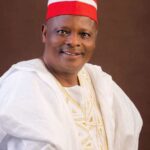By Felix Khanoba
The Federal Government has called for robust legislation to meet the present challenges of conducting examinations in the country.
Minister of State for Education, Dr. Tanko Sununu, made the call at a one day retreat organised by the National Examinations Council (NECO) on Monday in Abuja.
Represented by the Permanent Secretary, Federal Ministry of Education, Didi Esther Walson-Jack, the minister said the effectiveness of NECO’s operations is intricately linked to the legislative environment in which it operates.
“Legislation not only establishes the legal framework for NECO’s activities but also acts as a mechanism for safeguarding the integrity of examinations, protecting students’ rights, and ensuring accountability and transparency in assessment procedures.
” Despite the significance of examination legislation, we cannot ignore the challenges we face in this realm. From outdated laws and regulations to emerging issues like examination malpractice and digital transformation, there is an urgent need to review and modernize our legislative frameworks to effectively address these evolving challenges, ” the minister said.
Also speaking at the event that had its theme as ‘Legislative Functions: The Imperatives of Achieving NECO’s Mandate and the Challenges of Examination Legislation in Nigeria,’ the chairman of the occasion, Governor Mohammed Umar Bago of Niger State, said it was important to look into the existing laws that guide NECO in the conduct of its various examinations to address issues of artificial intelligence and other modern technology.
“This retreat is very timely, and I’m very impressed that the members of the National Assembly are fully represented looking at what the future holds for examination bodies like NECO in terms of innovation, the imperative of changing or amending our laws to be in tandem with technology, time, and innovation.
“For instance, artificial intelligence has come to stay, so our law must also be able to key into these technological advancements. So this retreat is timely.
“I also call on NECO and stakeholders to expand it beyond this hall so that other stakeholders will have input and also be able to come up with robust policies and laws in order to be sent to the national assembly,” the governor said.
On his part, Registrar/Chief Executive of NECO, Professor Ibrahim Dantani Wushishi, said the challenges in fulfilling NECO’s mandate highlight the critical need for a robust legislative framework.
He identified infrastructure constraints, a surge in candidate enrollment, inadequate funding, and examination malpractice, among others, as some of the key hurdles faced by the examination body.
This is just as he stressed the need for a review of the existing laws of the Council.
“These challenges underscore the critical need for a comprehensive national examination law specifically regulating all aspects of examinations in Nigeria. We lack such a law, relying instead on a patchwork of regulations across examination bodies and individual schools. This creates vulnerabilities in the system. Effective examination legislation offers a multitude of benefits,” Wushishi said.
In a keynote address, the Majority Leader of the House of Representatives, Professor Julius Ihonvbere, called for urgent reforms in the examination system to tackle the identified challenges.
Ihonvbere, who also frowned at the attitude of some international secondary schools, which are reluctant to register their students for NECO exams, said the examination should be made compulsory in all schools, either local or international.
The AUTHORITY reports that the retreat, which attracted National Assembly members including Senators Orji Uzor Kalu, Gbenga Daniel, and Osita Izunaso, among others, also had in attendance other major stakeholders in the education sector.



